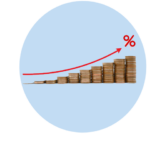Fixed Deposits or Mutual Funds – Which is Better
Key Features






Where to Invest?
As far as savings are concerned, fixed deposits (FD) are the most preferred option for investors. The reason is, this is one of the oldest savings instruments and considered the most secure with a fixed rate of return.
But is it still the most appropriate investment option at the present time? Does it still offer the best returns? Or are there other investments such as Mutual Funds that offer better returns and help reach a goal in a better way?
Read more to find out which one out of Mutual Fund or Fixed Deposit is a better investment option.
FD or Mutual Funds
FD, also known as Fixed Deposit, is a popular savings tool provided by banks for both short-term and long-term investments. The rate of return on FDs is fixed and pre-determined by the Government of India; so rising inflation doesn’t affect the return on these investments. Notably, the FD returns are taxable to the investors but the FD investments are eligible for tax deductions under Section 80C of the Income Tax Act.
Mutual Funds, on the other hand, are market-oriented investment instruments without a fixed rate of return. However, in the long run, it was observed that they gave a return of 10-15% return, which is quite higher than the return given by FDs. There are 3 types of Mutual Funds – Debt, Equity and Balanced.
Debt Mutual Fund invests most of the investment into government bonds, corporate bonds, and securities and the remaining amount in the stock markets whereas Equity Mutual Funds invest more in the stock market and less in government bonds, corporate bonds, and securities. Balanced Mutual Funds invest partly in both Debt and Equity Funds.
Difference between FD and Mutual Funds
The question remains whether to invest in a Mutual Funds or a Fixed Deposit. The following comparison of Mutual Funds vs. Fixed Deposit is based on certain parameters which can help you to take a decision.
Return on Investment
A Fixed Deposit offers pre-determined returns that do not change throughout the duration of investments whereas they offer higher returns on long-term investments as they are market-related. Longer the investment duration, better the returns from Mutual Funds.
Rate of Return
The interest rate on FDs is generally fixed according to the duration and type of FD. Hence, they are not expected to give a higher rate of interest. On the other hand, the rate of return of Mutual Funds depends on the volatility of the markets as well as the type of fund. When the market goes up, you may expect higher returns and vice versa.
Risk Factors
Fixed Deposits are considered the most secure with almost no risk, as the returns are pre-determined whereas Mutual Funds carry a high risk as the investment is made in the financial market. Equity Mutual Funds with a majority of the amount invested in the stock market, are at higher risk than the Debt Mutual Funds.
Impact of Inflation
Fixed Deposits are not affected by inflation as the interest rate is pre-determined. While Mutual Fund returns are adjusted for inflation, which enhances their ability to generate better returns.
Liquidity
Fixed Deposits are not liquid as the invested amount remains locked for a certain period of time. If the FD is being withdrawn earlier than the maturity, a penalty is charged to the investor. Mutual Funds, on the other hand, have a higher liquidity because the funds can be sold even in a short period of time without significant impairment of the value of the fund.
Taxation
The interest earned from the FD is taxable according to the individual’s tax bracket, while the taxation on Mutual Funds is dependent on the holding period. Short-term capital gains as well as Long-term capital gains are taxed differently.
Tax Savings – FDs vs. Mutual Funds
Investors who prefer FDs for tax savings under Section 80C of the Income Tax Act after the end of the five-year lock-in period would like to consider the Equity Linked Savings Scheme (ELSS) Mutual Funds as an alternative. ELSS has the shortest lock-in period of 3 years and has given better returns historically.
Which is better, FD or Mutual Fund?
The decision to invest between a bank FD and a mutual fund depends on the risk capacity of the investor and the surplus amount he would like to invest. FD generally requires a lump sum amount whereas Mutual Funds investments can be made with as little as Rs. 500 per month. However, investing in Mutual Funds makes more sense as they provide better returns over the long term and you can plan them based on the goals you wish to achieve.
